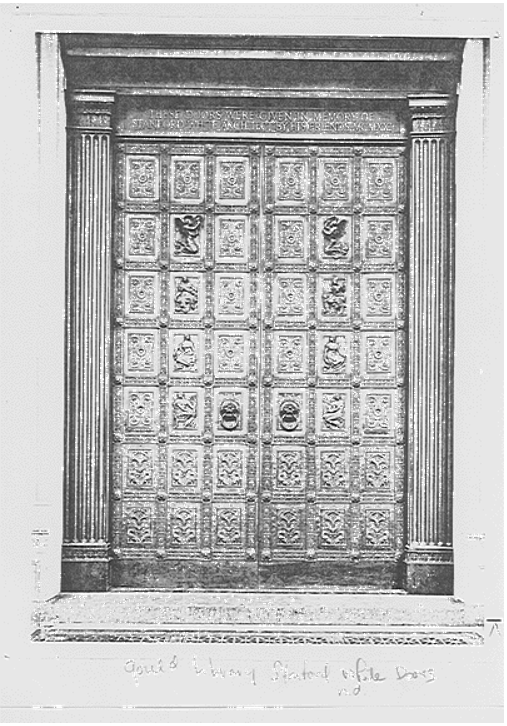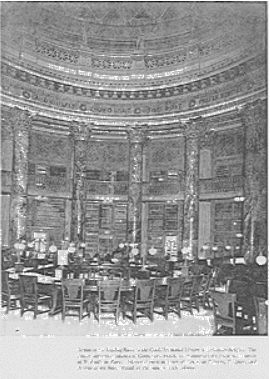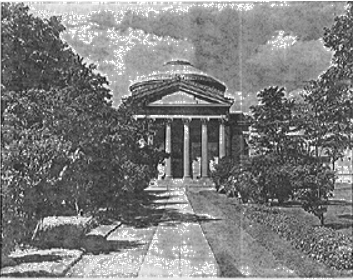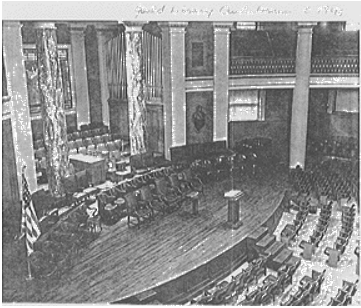The dedication took place on May 30, 1901, Memorial Day. “Several thousand,” wrote the New York Tribune, “sat on a gentle hillside whose emerald green grass sloped away in front of them and rose behind them to the base f the noble hall, whose massive granites crowning the summit of the hill look as if they would last as long as fame endures.” (Before the century was out, it had to be shored up to prevent sliding.) Near the bottom of the hill the chosen orator, U.S. Senator Chauncey M. DePew, stood alongside Chancellor MacCracken. Had the semi-circular Colonnade been built to face west instead of east, the effect would have been somewhat like that of an ancient Greek amphitheater.
Many nineteenth century practitioners of oratory were conspicuous for noble posture. They had the capacity to make large, if sometimes unprovable claims, and their reading of future events did little to dim the glory of the ancient Hebrew prophets. they spoke in long, rolling sentences, rich in modifier and descriptive detail. In spite of their frequent ascents to the clouds for refreshment, they did often utter thoughts worthy of the day




For two centuries oratory had virtually dominated American public life. In colonial times “the pulpit, not the altar, had the place of honor in the New England meeting house.” From it came the vice of edification. On Sunday it was a feast of words in best dress after a six-day week of long hours. And a temporary exposure to the upper classes: social uplift by propinquity. Well into this century, at both church and public hall, working class America could hear from preacher and platform orator the good, if now and then turgid, English they did not use at home or workplace.
(Writing in her classic Domestic Manners of the Americans, Mrs. Frances Trollope regretted that she “very seldom, during my whole stay in the country, heard a sentence elegantly turned and correctly pronounced from the lips of a single American.” She was, of course, writing chiefly of newly settled lands, not Boston.)
Chauncey DePew was one of the gold-mouthed. Apparently he rose to the occasion on the first Memorial Day of the Twentieth century. Louis Albert Banks, in another book called Hall of Fame, regretted that no complete report was made of the speech. But the text of the eight paragraphs printed in the news reveals that the Senator lived up to his reputation. The omission of the full text may therefore be forgiven.
“It is doubtful” said DePew, “if in any period but ours the great statesman, writer or artist ranked with the soldier” . . ., a statement that itself raises some doubt. In ancient Rome, a statesman often ranked with a soldier because he likely was a soldier, who knew that if the statesman in him failed, the general in him would have to lead an army. . . “But even our wars, continued DePew, “resulted in the unification. . . under one government of kindred races, the enlargement of popular liberty, and marvelous material development.”
The ringing out of the nineteenth century was accompanied by victories which had subdued the powers of the earth, the waters and the air to the service of man, and an equally beneficent evolution in human rights. It was a happy thought that moved the donor of this Hall of Fame in the midst of these rejoicings to found a temple to enshrine the memorials of the architects of this triumph; the supreme intelligence whose labors and initiative caused the nineteenth century to stand out high, conspicuous, and unapproachable in its grandeur among the centuries.
Not too much overdone, as custom went in those days. The Senator continued: “Standing on the banks of the noble Hudson [the Hall is on the Harlem River] and at the gateway of the New World, it welcomes from every section of the country all who are worthy to sit as peers in the company of immortals who form its first parliament.”
Then the touch of history as rhetorical warm-up, required for such occasions:
By slow, laborious and perilous processes the primeval forests had to be cut and the wilderness subdued for the settlement and support of the colonists. Savages and soil were inhospitable to these scattered adventurous families seeking homes and liberty of conscience in unknown and unexplored land across the sea.
Words to the wealthy are always in order, especially in a shower of rich nouns:
When this period of evolution is over and nations and communities have become adjust to normal conditions, the fever and passion of the race for quick wealth and enormous riches will be over . . . Unless this shall happen, then let the luxuries and opportunities and the evanescent earthly pleasures which come from leadership in business be the rewards of the successful; but reserve the Temple of Fame for those whose only deeds and thoughts are the inheritance, education, inspiration and aspiration of endless generations.
It later came out that Senator DePew had been on an annual retainer to a business firm
The speech ends with a denial of the founding premise of immortality, and a dire prediction:
In the cemeteries of France graves are leased for periods of five, ten, twenty, or fifty years, and in perpetuity. As the terms of the leases expire, the bones are dug up and dumped into the common receptacle to make room for newer tenants. So in time, in this Hall of Fame, winnowing will attend selection. Only tenants who by the judgment of posterity hold their titles in perpetuity will remain, and they will have fame.
Unless the Senator had been misquoted or had mistaken winnowing for the University Senate’s veto power over admissions, he is recommending the use of the recall. What vacancies would be created today, we wonder.